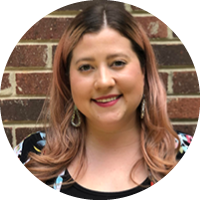
by Christina Spence
Data Sharing Project Coordinator

Crosby Scholars program participants. Photo from Crosby Scholars website.
Welcome once again to the Data Sharing Project Partner Spotlight Blog Series! This time around, we are spotlighting our partner – Crosby Scholars! Crosby Scholars has been a Data Sharing Project (DSP) partner since the 2018-2019 School year. I sat down with Barbara Masi, the Director of College Access, to talk about the work we are doing with them this school year.
What does Crosby Scholars do? Crosby Scholars is a college access program that assists students in public middle and high schools in Forsyth County prepare academically, personally, and financially for college admission and other post-secondary opportunities. They serve thousands of students every year. The program gives information on college admission requirements and financial aid to help students and families navigate the college planning process. For students who need financial assistance, they offer need-based Last Dollar Grant scholarship assistance up to $1,200 a year to help finance a college education. To learn more about Crosby Scholars, CLICK HERE!
Keep reading to learn more about the work Crosby Scholars is doing with DSP during the 2021-2022 school year!
Who are you and what do you do at Crosby Scholars?
I am Barbara Masi, and I’m the Director of College Access at Crosby Scholars. I oversee the programming aspect of Crosby. So, the middle school program, the high school program, the junior/senior program, the student advising program, and the financial aid program.
If someone walked up and asked you about the Data Sharing Project, and you only had a couple minutes to talk about the project, what would you tell them?
The DSP provides us with current and accurate data on our students, which helps us reach our goals. It helps us better serve our students, helps us reach our families, it has helped us engage our parents and mentors, and it helps us better communicate with the school system. It gives more accurate data than what is often self-reported by students.
What about some of the Continuous Quality Improvement supports that have been provided through the Data Sharing Project?
Most recently your evaluation team has assisted us with drafting and updating some surveys. We want to make sure we are asking appropriate questions and providing relevant answer selections so the surveys will provide us with the necessary information we need to make data-driven decisions. The biggest project that I’ve worked on with your team was the Crosby graduate survey. We survey graduated Crosby Scholars during their first years in college, asking about things like their experience with Crosby Scholars and the services that we offered. The DSP’s Evaluation Manager worked with us a lot on helping develop those questions and took all the survey responses and provided a report that I could share with our Board of Directors and say, “Here’s where we’ve had some successes. Here’s some challenges,” and made some recommendations on our challenges based on that report.
The DSP Evaluator also worked with our middle and high school Program Coordinators, Tara Stokes and Jessica Fisher, on our parent engagement survey. She updated the survey for us and analyzed the responses and put it into a report. Parent engagement is a big goal of ours and COVID-19 has made it an even bigger goal. We’re just so much more successful when we can engage parents, and we realized the importance of the parent or the guardian in the college-going process. So, if we can engage those parents and get them on board, and offer services to them as well, then that’s a win-win.
One of the questions on the parent survey gave parents the opportunity to join a parent council, and we were able to create a parent council based on those survey responses! We have taken up that initiative and have held kickoff meetings and held our first meeting already. We’ll be working with that council and asking them opinions on our services and topics that we’re presenting to their students and asking them to share some of the challenges their students are facing. It also led to some other ways to engage the students that we traditionally didn’t follow. For example, TikTok! Many of our students are on TikTok, and when a traditional newsletter email wasn’t providing the engagement we were looking for, we shifted our approach, so it’s been very helpful, very beneficial.
Also, from the parent survey, we learned that our community service requirement was a barrier to program completion for 10 percent of respondents. As a result, we have created a community service opportunities webpage with over 40 virtual and in-person youth volunteer opportunities for our students and families to utilize. We also began a partnership with SPARK, a local nonprofit, to host community service opportunities monthly exclusively for Crosby Scholars. We have had over 850 Crosby Scholars serve virtually and in-person to date to complete their requirement through this partnership.
What has been the biggest benefit to your partnership with the Data Sharing Project?
I think the biggest benefit has been to get clean, accurate data on the students — knowing where they are and being able to contact them through their schools or through their home environment. But there have been so many advantages! Receiving grades in a format where we can upload them into our database has saved MANY staff hours with data entry. Receiving test scores, FAFSA completion statuses, and quarterly reports has allowed us to make data-driven programming decisions. For example, the data has helped us understand that we need to expand one-on-one advising to the junior level. There are a lot of important things happening with our partnership.
What do you hope to accomplish through your continued partnership with the Data Sharing Project?
Some of the goals are going to be continuing to get accurate data and statuses for students. It helps us so much when we have over 10,000 students in the program. It helps us know when students move from school to school, when students are leaving the district, and when students are graduating early.
We are also excited about the work we are doing with our outreach programs. We have an outreach program for Hispanic females, Hispanic males, and a program to introduce STEM services to our Hispanic/Latina females and African American females. We also have an outreach program for African American males. To be able to do a program evaluation for these outreach programs is exciting for our staff. It’s something that we’ve wanted to do for a long time. Having data to support that work is important. We think that we have strong programming and strong messaging for our outreach programs, and our families benefit by being part of Crosby Scholars, but through the evaluation we have planned with DSP, now we are going to have the data that shows that. And if there are some areas that need improvement, it’s not just guesswork, we’re going to have the evaluation to identify areas where we provide great services, but also areas where our students and families may be wanting more.
The support from DSP is also going to help us with grant opportunities. A lot of the grant cycles now want to know what we are doing with outreach. I think working with DSP is going to be positive for the various outreach teams we have.
Is there anything else you would like to add that you think would be helpful for our readers to know?
If any student enrolled in a public school in Forsyth County believes a form of post-secondary education is in their future, they should definitely be a Crosby Scholar!
—
Thank you for checking in for another Data Sharing Project partner spotlight! If you would like more
information about Crosby Scholars, please visit their website!
If you are interested in learning more about the Data Sharing Project, or know of a program in Forsyth County that may benefit from a partnership with us, be sure to check out our website, and reach out to me, Christina Spence, at Chspence@wsfcs.k12.nc.us.
Until next time!
*Data Sharing Project does not release Personally Identifiable Information from student education records without parent consent and confirmation of program enrollment*
